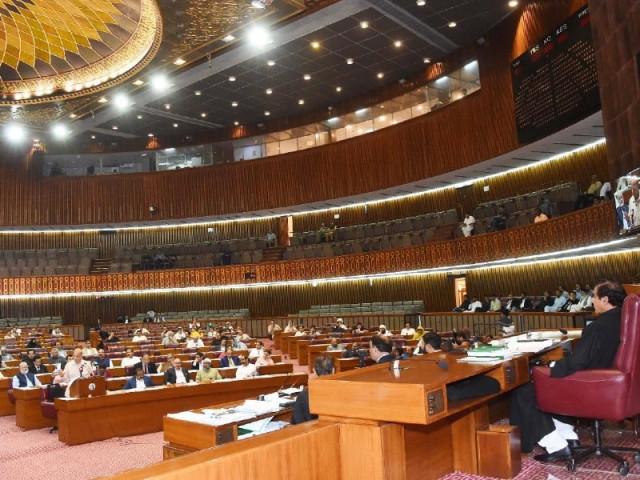NA resolution rejecting SC poll order: An exercise in futility
Legal eagles say document has no legal worth

The National Assembly has passed a resolution against the Supreme Court’s April 4 verdict. However, the real threat to the apex court comes from within.
A senior lawyer, who is closely watching the ongoing situation, said sanity must prevail now. He also urged retired judges and senior lawyers who have good reputation to play their roles to end the division within the Supreme Court.
"After learning about their future plans, I have decided to contact ex-chief justices Tassaduq Hussian Jilani and Nasirul Mulk and senior lawyers like Hamid Khan and Muneer A Malik to play their roles in easing the tension between the two sections of the apex court," he said while requesting anonymity.
“However, both sides will be a loser, if the situation persists,” he warned. Since filing of a reference against senior SC judge Qazi Faez Isa, the apex court has been divided into two ideological camps. The differences among them have widened in the last couple of weeks as both these sections of judges have passed judicial orders to annul each other’s opinions.
Now judicial politics has already converted into a ‘judicial war' which is now entering its final round in which both sides, some experts believe, can go to any extent for their survival.
It is learnt that a complaint is being filed against Justice Qazi Faez Isa this week in the Supreme Judicial Council (SJC), the legal forum that can hold judges of superior courts accountable.
Justice Isa and Justice Sardar Tariq Masood have already written to the SJC members to initiate proceedings on the complaints filed against Justice Sayyed Mazahar Ali Akbar Naqvi.
Chief Justice of Pakistan (CJP) Umar Ata Bandial has already disclosed his views on those complaints by doubting evidence against Justice Naqvi.
One section of the government is also pushing for filing presidential references against the three SC judges including CJP Bandial who on April 4 directed the Election Commission of Pakistan (ECP) to hold elections for the Punjab Assembly on May 14.
However, some senior lawyers agree that CJP Bandial should take some practical steps to end mistrust among fellow judges.
The NA resolution
Commenting on the National Assembly’s Thursday resolution, a lawyer said it has no legal worth and yet it will cause anguish for a section of judges.
Former additional attorney general Tariq Mahmood Khokhar said the NA resolution is of no constitutional or legal consequence. It cannot overrule or dilute the SC order.
“It is a futile attempt on part of the legislature to encroach upon the domain of the judiciary. Parliament cannot even discuss the conduct of a superior court judge in the discharge of his duties."
Khokhar said it is a mere resolution and not a legislative overruling.
"In the instant case, the SC’s constitutional ruling is final which can be altered only by a constitutional amendment or by a new ruling of the SC,” he said.
Commenting on the present situation, Hafiz Ahsaan Ahmad said it is very unfortunate that despite clear constitutional provisions these important institutions are standing at a crossroads.
“This is not at all in the interest of the country and democracy.”
He said it is also unprecedented in the history of the National Assembly that a resolution is passed against a judgment of the Supreme Court.
“This resolution signed by 42 MNAs might have no legal effect on the recent judgment but it has undermined the image of both the parliament and the judiciary, which is not in the larger interest of the country.”
He said as per Article 121 of the Constitution the conduct of a superior court judge with reference to discharge of his or her duties could not be discussed on the floor of the house.
“A complaint against a judge can only be routed through the president who refers it to the Supreme Judicial Council under Article 209 of the Constitution,” he added.
Ahsaan said there is an immediate need that all the points which have been repeatedly agitated by the bar councils at different occasions –-like invoking Article 184( 3) of the Constitution, the process of appointment of judges to superior courts and reforms for early dispensation of justice-- should be addressed immediately on priority through full court proceeding as “this is the best forum to agitate and address all the points”.
He said the Supreme Court Rules 1980 had been made in pursuance of Article 191 of the Constitution through full court proceedings.
“Under Order 11 of the rule constitution of benches, fixation of cases and conducting the proceedings under Article 184(3) of Constitution in suo motu proceedings are the undeniable power and prerogative of the chief justice,” he said.



















COMMENTS
Comments are moderated and generally will be posted if they are on-topic and not abusive.
For more information, please see our Comments FAQ